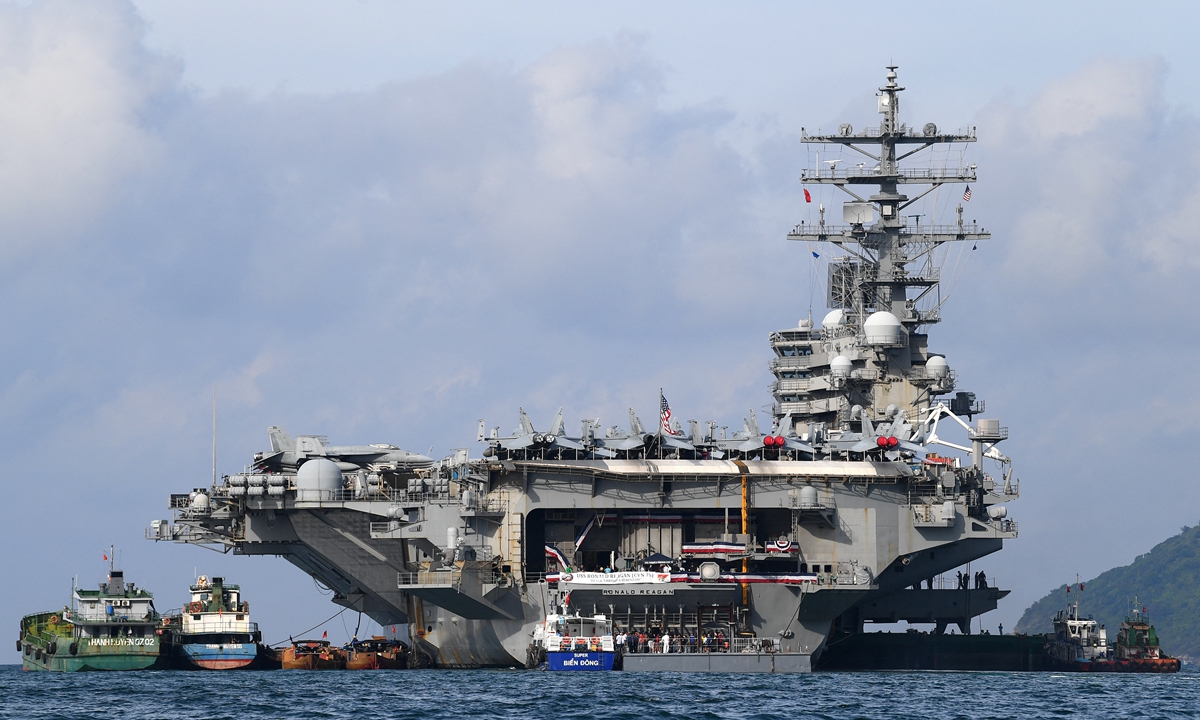As the US enhances the implementation of its Indo-Pacific Strategy, the country has been directing its focus on Vietnam. However, despite Washington’s efforts to pull Hanoi to its side to confront and encircle Beijing militarily, Vietnam is unlikely to take the bait.
USS Ronald Reagan, a US nuclear-powered aircraft carrier, arrived in the central Vietnamese city of Da Nang on Sunday and will stay until Friday. It was the third visit by a US aircraft carrier to Vietnam since the end of the Vietnam War. By paying a rare visit to Da Nang, the US aircraft carrier is sending a strong signal to China: It is sailing into China’s neighborhood to show off the US’ strong military presence in the South China Sea and its influence in the region. In addition, this demonstrates Washington’s desire to strengthen military relations with Hanoi.
The USS Ronald Reagan‘s trip comes as the US and Vietnam celebrate the 10th anniversary of their “comprehensive partnership,” and Washington is keen to upgrade their bilateral relations. After US and Vietnamese leaders expressed their willingness to promote bilateral ties in late March, US Secretary of State Antony Blinken made a quick visit to Hanoi in April, during which he called the ties with Vietnam “one of the most dynamic and one of the most important relationships” the US has had, and made it clear he wanted to upgrade diplomatic ties.
However, it is not entirely accurate to claim that the Biden administration has shown a growing interest in cultivating amicable relations with Hanoi. Rather, the US appears to be increasingly recognizing Vietnam’s significance as a pawn to counterbalance China.
Chinese military expert and TV commentator Song Zhongping told the Global Times that China is a topic that cannot be avoided in the process of upgrading US-Vietnam relations. He noted that Washington uses China-related issues as a bargaining chip in talks with Vietnam regarding strengthening cooperation. In other words, the more strained the relationship between Vietnam and China becomes, the more the US will reward Vietnam and be willing to cooperate with the latter.
Even though the US and Vietnam have been getting closer in recent years, one cannot ignore the structural conflicts between the two countries that have led to political distrust. The unease between the two over the historical issue of the Vietnam War has not yet been completely settled. Along with the two sides’ irreconcilable conflicts in ideological values and human rights issues, these are the important reasons that prevent closer cooperation between the US and Vietnam.
At the heart of their bilateral relations lies how Vietnam perceives the US, which may ultimately become a major factor in determining how closely Hanoi wants to cooperate with Washington. However, since the US pursues a global hegemonic strategy of hoping to dominate a unipolar world and suppress other countries for various reasons, it is evident that Vietnam does not want to get too close to the US.
On the same day that the US aircraft carrier docked at Da Nang, Vietnamese Prime Minister (PM) Pham Minh Chinh arrived in Beijing to begin an official visit to China, the first by a Vietnamese PM to China after seven years. The Vietnam News Agency reported that Chinh’s visit highlights Vietnam’s consistent foreign policy of independence, self-reliance, diversification and multilateralization of external relations as well as the importance Vietnam attaches to its ties with China. This is Hanoi’s way of saying that it will continue to adhere to a balanced diplomacy between China and the US.
It also shows that Hanoi is maintaining a certain amount of caution about Washington’s roping-in endeavors. Vietnam will not take the side of the US because it is not in its interest. Even if Vietnam strengthens cooperation with the US, it will still be limited in scope. In fact, Southeast Asian countries like Vietnam still have doubts about the US’ growing interference in regional affairs, which could lead to an escalation of conflicts in the region.
Song said Vietnam will think twice if cooperating with the US means directing the spearhead at China. After all, China and Vietnam are so close geopolitically and their trade and economy are so intertwined. “All these show that it will not be easy for Washington to fulfill its wish of roping Hanoi into its anti-China strategy,” he noted.













